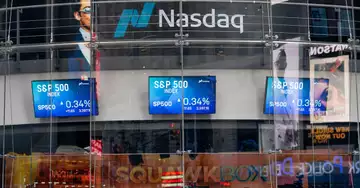Financial advisors like to talk about how Bitcoin is just a substitute for the Nasdaq because of its price volatility and high correlation to stocks.
They are more right than they realize, but for all the wrong reasons. In the 2020s, Bitcoin will likely prove to be a driver of returns in investors' portfolios, just as the top Nasdaq-listed companies have been over the past decade. Financial advisors should position their clients accordingly.
Upgrade Bitcoin from Amazon to Nasdaq.
In late 2020, I argued that Bitcoin was the next Amazon. So much has changed since then that this view needs to be revised. While I still believe that Bitcoin's future percentage returns are in the same ballpark as Amazon's over a decade ago, looking at Bitcoin's investment potential in terms of a single company today is too limiting.
A better analogy today is the elite members of Nasdaq. With a total market capitalization of over $20 trillion, this index (and its major constituents) were the primary source of wealth for equity investors in the decade that ended last year. The seven largest companies in the index - Apple, Microsoft, Alphabet (Google), Amazon, Tesla, Nvidia and Meta (Facebook) - accumulated a total value of about $11 trillion, of which about $10 trillion (i.e., 90%) was generated in the last decade.
But circumstances have changed for this extraordinarily successful group of companies. They face growing hurdles, particularly (1) regulation and (2) rising inflation (and thus interest rates).
Regulatory Hurdles for Nasdaq Favorites.
Before the November 2020 U.S. election, I believed that the regulatory risk for Bitcoin was already lower than that for the Nasdaq giants. Public opinion had already turned against these titans of the data industry as concerns arose about election fraud and manipulation. Terms like "surveillance capitalism" entered the vernacular.
Congress took a harder look at the industry as the public realized that these companies were defrauding us by
That was before the appointment of a competition regulator seemingly intent on reining in Internet monopolists, and before the intensification of action by European regulators already on the same path. Suffice it to say, the regulatory path has become even steeper for Nasdaq's elite members, making it less likely that they will achieve 10 times the returns of the last decade this decade.
The Great Inflation in the 2020s.
To understand Bitcoin's significance for the coming decade, one should start with inflation. Inflation is impossible to predict because it contains a large social and psychological component. It may take time for people to change their expectations for the future, demand higher wages today, negotiate to lock in future wage increases, and complete the inflationary wage/price spiral. However, there are numerous inflationary factors that do not depend on unpredictable human psychology, and these factors cry out for sustained higher inflation. The following are some of the major inflationary factors:
De-globalization (shifting supply chains) due to the pandemic and increasing geopolitical conflicts between major powers (manifested most recently in the Ukraine war) reduces global access to cheap raw materials and cheap labor. This raises the overall production costs of goods and services.
The shrinking of the domestic labor pool due to the retirement of Boomers (the second largest generation in history) cannot be offset by new workers because Generation Y is so much smaller. As a result, the total cost of production for goods and services increases. The overall demographic picture is similar worldwide. Declining birth rates in recent decades have resulted in fewer and fewer young adults entering the workforce. Fewer workers mean higher inflation.
Increased government deficit spending due to numerous factors, including payment of entitlements, necessitates increased government borrowing and monetization of government debt. This increases the money supply that demands goods and services.
Because of these inflationary factors, astute analysts have drawn comparisons in the 2020s to the 1940s and 1970s. In both cases, these were periods of high consumer price inflation, when consumer price inflation was well above interest rates, which helped the economy manage its debt. Moreover, total debt as a percentage of total economic output is much higher today than it was during those two periods, making potential inflation all the more attractive.
In the 1940s, owning gold for investment purposes was illegal. That didn't stop many Americans from owning it and protecting their purchasing power. In the 1970s, gold was the best performing investment. Gold investors earned a return of about 30% on an annual basis. In contrast, stocks earned an annual return of only 5%. With inflation averaging over 7% per year, stocks lost at least 2% of their purchasing power per year during the decade. Bonds lost 4% per year in real terms.
That brings us to digital gold, also known as bitcoin. With a total network value of about $600 billion, Bitcoin is worth (in nominal terms) about the same as the sum of the seven largest members of Nasdaq a decade ago. And Bitcoin could easily amass another $10 trillion in value this decade, just as these companies did in the previous decade.
The Nasdaq has had a great run over the past decade. Recent price action suggests that may be coming to an end. The Bitcoin price has also had a rough time lately. But given that Bitcoin is the hardest monetary asset ever invented, and the forces of inflation are likely to persist, I expect Bitcoin to be the must-own asset of the 2020s.

